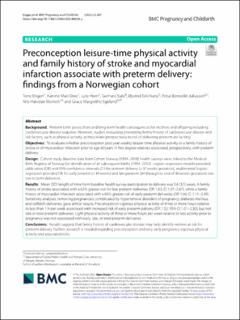| dc.contributor.author | Engen, Tone | |
| dc.contributor.author | Owe, Katrine Marie | |
| dc.contributor.author | Horn, Julie | |
| dc.contributor.author | Sulo, Gerhard | |
| dc.contributor.author | Næss, Øyvind Erik | |
| dc.contributor.author | Juliusson, Pétur Benedikt | |
| dc.contributor.author | Morken, Nils-Halvdan | |
| dc.contributor.author | Egeland, Grace Margrethe | |
| dc.date.accessioned | 2022-06-28T12:20:46Z | |
| dc.date.available | 2022-06-28T12:20:46Z | |
| dc.date.created | 2022-03-10T10:34:42Z | |
| dc.date.issued | 2022 | |
| dc.identifier.issn | 1471-2393 | |
| dc.identifier.uri | https://hdl.handle.net/11250/3001334 | |
| dc.description.abstract | Background
Preterm birth poses short and long-term health consequences for mothers and offspring including cardiovascular disease sequelae. However, studies evaluating preexisting family history of cardiovascular disease and risk factors, such as physical activity, as they relate prospectively to risk of delivering preterm are lacking.
Objectives
To evaluate whether preconception past-year weekly leisure-time physical activity or a family history of stroke or of myocardical infarction prior to age 60 years in first degree relatives associated, prospectively, with preterm delivery.
Design
Cohort study. Baseline data from Cohort Norway (1994–2003) health surveys were linked to the Medical Birth Registry of Norway for identification of all subsequent births (1994–2012). Logistic regression models provided odds ratios (OR) and 95% confidence intervals (CI) for preterm delivery (< 37 weeks gestation); multinomial logistic regression provided OR for early preterm (< 34 weeks) and late preterm (34 through to end of 36 weeks gestation) relative to term deliveries.
Results
Mean (SD) length of time from baseline health survey participation to delivery was 5.6 (3.5) years. A family history of stroke associated with a 62% greater risk for late preterm deliveries (OR 1.62; CI 1.07–2.47), while a family history of myocardial infarction associated with a 66% greater risk of early preterm deliveries (OR 1.66; CI 1.11–2.49). Sensitivity analyses, removing pregnancies complicated by hypertensive disorders of pregnancy, diabetes mellitus, and stillbirth deliveries, gave similar results. Preconception vigorous physical activity of three or more hours relative to less than 1 h per week associated with increased risk of early preterm delivery (OR 1.52; 95% CI 1.01–2.30), but not late or total preterm deliveries. Light physical activity of three or more hours per week relative to less activity prior to pregnancy was not associated with early, late, or total preterm deliveries.
Conclusions
Results suggest that family history of cardiovascular disease may help identify women at risk for preterm delivery. Further, research is needed regarding preconception and very early pregnancy vigorous physical activity and associated risks. | en_US |
| dc.language.iso | eng | en_US |
| dc.publisher | BMC | en_US |
| dc.rights | Navngivelse 4.0 Internasjonal | * |
| dc.rights.uri | http://creativecommons.org/licenses/by/4.0/deed.no | * |
| dc.title | Preconception leisure-time physical activity and family history of stroke and myocardial infarction associate with preterm delivery: findings from a Norwegian cohort | en_US |
| dc.type | Journal article | en_US |
| dc.type | Peer reviewed | en_US |
| dc.description.version | publishedVersion | en_US |
| dc.rights.holder | Copyright The Author(s) 2022 | en_US |
| cristin.ispublished | true | |
| cristin.fulltext | original | |
| cristin.qualitycode | 1 | |
| dc.identifier.doi | 10.1186/s12884-022-04528-y | |
| dc.identifier.cristin | 2008740 | |
| dc.source.journal | BMC Pregnancy and Childbirth | en_US |
| dc.source.pagenumber | 341 | en_US |
| dc.identifier.citation | BMC Pregnancy and Childbirth. 2022, 22, 341. | en_US |
| dc.source.volume | 22 | en_US |

